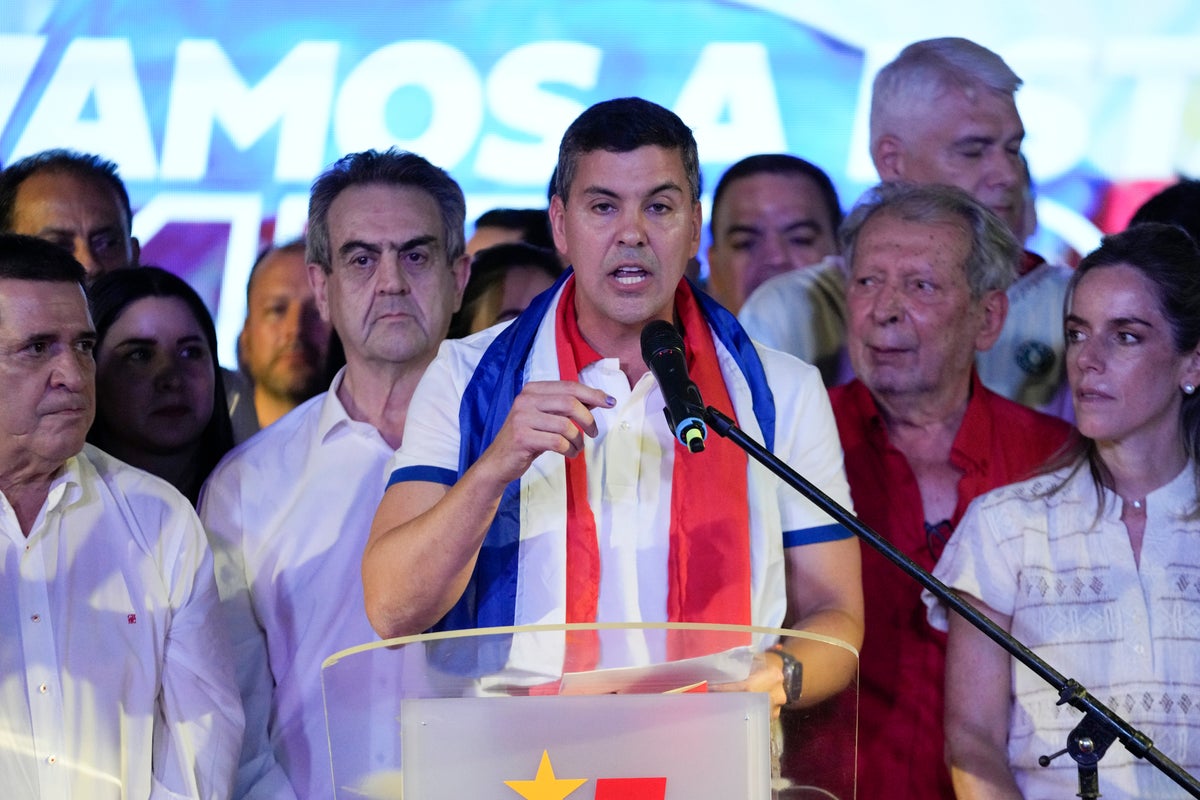
Conservative Santiago Peña's overwhelming win in Paraguay's presidential election not only reaffirmed the long-ruling Colorado Party's hold on power but raised questions about the future role of his powerful political mentor, who has been accused of corruption by the United States.
Peña, a telegenic, 44-year-old economist, won Sunday’s election with 43% of the vote, compared to 27% for Efraín Alegre of the Pact for a New Paraguay, in what was a shock to pollsters who had predicted a close race. Paraguayo Cubas, a right-wing populist, did better than expected with 23%.
The Colorado Party, which has governed Paraguay almost uninterrupted since 1947, will also control Congress, having won 23 out of 45 seats in the Senate and 48 of 80 in the Lower House. It also won 15 out of 17 disputed governorships.
While celebrating the victory, Peña openly thanked his mentor, former President Horacio Cartes, who was standing next to him on stage: “Dear Horacio, you believed in me when I had no political history, no political experience.”
Peña said Monday in a television interview that Cartes “will continue to be a decisive figure in Paraguayan politics” but emphasized he will have “zero interference in the justice system” after taking over the presidency on Aug. 15.
Cartes, who was president of the South American country from 2013 to 2018, has been accused by Washington of involvement in “significant corruption,” bribing government officials and legislators, and of having ties to terrorism.
“For more than a decade, Cartes leveraged his illicitly acquired wealth and influence to expand his political and economic power over Paraguayan institutions,” the State Department said in January.
The presidential campaign of Peña, who was finance minister in Cartes' government, was hit by U.S. economic sanctions against Cartes for alleged bribery and ties to Hezbollah, which the U.S. designates as a terrorist organization.
Cartes, who is president of the Colorado Party, has denied the allegations and Peña called them “groundless.”
Beatriz Candia, a municipal worker, said she voted for Peña “because I come from Colorado parents. I was raised with that doctrine.”
“I have a lot of hope in Santiago Peña, he’s pro-life and pro-family, which are fundamental pillars for our society and future generations,” she said.
Some analysts said the relative strength of Paraguay’s economy was a boon for Peña.
“The economy has been functioning relatively well for two decades. Stability and inflation are not what most concern Paraguayans,” César Barreto, a former finance minister, said.
Alegre, the second place candidate, represented a coalition of disparate parties that analysts had described as the best chance in recent history for the opposition to snatch power from the Colorado Party. In the end though, it wasn’t even close.
Jorge Fernández, who owns a stall in an Asunción market, said he was “frustrated” with the results.
“Nothing is going to change, we already know who runs the country, who the boss is,” he added.
Analysts said Peña could be beholden to Cartes once in office.
“He won’t be able to govern without Cartes,” said historian and analyst Milda Rivarola from the Paraguayan Academy of History. “At the same time, Cartes has that Sword of Damocles: whether he will be extradited.”
Before the election, Peña emphasized that it was up to the courts, and not the presidency, to decide on a potential extradition.
Sebastián Acha, a political consultant, predicted Peña will be leading “an uncomfortable government."
“We will have a president who won't be able to freely associate with the party president and who, at the first misstep, could be subject to impeachment.”
Peña, a U.S.-trained economist who has also worked at the International Monetary Fund, will be tasked with locating resources for a deficit-ridden state with one of the lowest tax rates in the region while trying to dent a poverty rate of 24%.
Additionally, he will have to prove to farmers how he will implement his plan to maintain Paraguay’s alliance with Taiwan while also opening up the Chinese market. Paraguay is the only remaining country in South America to have diplomatic relations with Taiwan, and those ties became an issue in the campaign.







